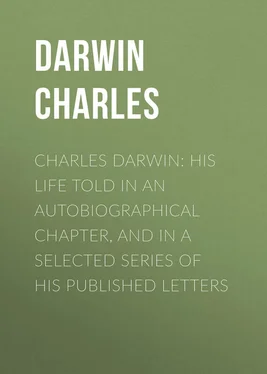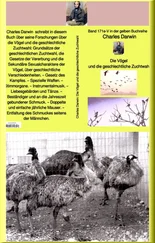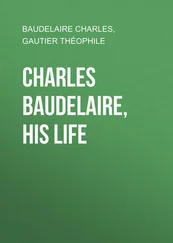Charles Darwin - Charles Darwin - His Life Told in an Autobiographical Chapter, and in a Selected Series of His Published Letters
Здесь есть возможность читать онлайн «Charles Darwin - Charles Darwin - His Life Told in an Autobiographical Chapter, and in a Selected Series of His Published Letters» — ознакомительный отрывок электронной книги совершенно бесплатно, а после прочтения отрывка купить полную версию. В некоторых случаях можно слушать аудио, скачать через торрент в формате fb2 и присутствует краткое содержание. Жанр: foreign_antique, foreign_prose, на английском языке. Описание произведения, (предисловие) а так же отзывы посетителей доступны на портале библиотеки ЛибКат.
- Название:Charles Darwin: His Life Told in an Autobiographical Chapter, and in a Selected Series of His Published Letters
- Автор:
- Жанр:
- Год:неизвестен
- ISBN:нет данных
- Рейтинг книги:5 / 5. Голосов: 1
-
Избранное:Добавить в избранное
- Отзывы:
-
Ваша оценка:
- 100
- 1
- 2
- 3
- 4
- 5
Charles Darwin: His Life Told in an Autobiographical Chapter, and in a Selected Series of His Published Letters: краткое содержание, описание и аннотация
Предлагаем к чтению аннотацию, описание, краткое содержание или предисловие (зависит от того, что написал сам автор книги «Charles Darwin: His Life Told in an Autobiographical Chapter, and in a Selected Series of His Published Letters»). Если вы не нашли необходимую информацию о книге — напишите в комментариях, мы постараемся отыскать её.
Charles Darwin: His Life Told in an Autobiographical Chapter, and in a Selected Series of His Published Letters — читать онлайн ознакомительный отрывок
Ниже представлен текст книги, разбитый по страницам. Система сохранения места последней прочитанной страницы, позволяет с удобством читать онлайн бесплатно книгу «Charles Darwin: His Life Told in an Autobiographical Chapter, and in a Selected Series of His Published Letters», без необходимости каждый раз заново искать на чём Вы остановились. Поставьте закладку, и сможете в любой момент перейти на страницу, на которой закончили чтение.
Интервал:
Закладка:
My father's mid-day walk generally began by a call at the greenhouse, where he looked at any germinating seeds or experimental plants which required a casual examination, but he hardly ever did any serious observing at this time. Then he went on for his constitutional – either round the "Sand-walk," or outside his own grounds in the immediate neighbourhood of the house. The "Sand-walk" was a narrow strip of land 1½ acre in extent, with a gravel-walk round it. On one side of it was a broad old shaw with fair-sized oaks in it, which made a sheltered shady walk; the other side was separated from a neighbouring grass field by a low quickset hedge, over which you could look at what view there was, a quiet little valley losing itself in the upland country towards the edge of the Westerham hill, with hazel coppice and larch plantation, the remnants of what was once a large wood, stretching away to the Westerham high road. I have heard my father say that the charm of this simple little valley was a decided factor in his choice of a home.
The Sand-walk was planted by my father with a variety of trees, such as hazel, alder, lime, hornbeam, birch, privet, and dogwood, and with a long line of hollies all down the exposed side. In earlier times he took a certain number of turns every day, and used to count them by means of a heap of flints, one of which he kicked out on the path each time he passed. Of late years I think he did not keep to any fixed number of turns, but took as many as he felt strength for. The Sand-walk was our play-ground as children, and here we continually saw my father as he walked round. He liked to see what we were doing, and was ever ready to sympathize in any fun that was going on. It is curious to think how, with regard to the Sand-walk in connection with my father, my earliest recollections coincide with my latest; it shows the unvarying character of his habits.
Sometimes when alone he stood still or walked stealthily to observe birds or beasts. It was on one of these occasions that some young squirrels ran up his back and legs, while their mother barked at them in an agony from the tree. He always found birds' nests even up to the last years of his life, and we, as children, considered that he had a special genius in this direction. In his quiet prowls he came across the less common birds, but I fancy he used to conceal it from me as a little boy, because he observed the agony of mind which I endured at not having seen the siskin or goldfinch, or some other of the less common birds. He used to tell us how, when he was creeping noiselessly along in the "Big-Woods," he came upon a fox asleep in the daytime, which was so much astonished that it took a good stare at him before it ran off. A Spitz dog which accompanied him showed no sign of excitement at the fox, and he used to end the story by wondering how the dog could have been so faint-hearted.
Another favourite place was "Orchis Bank," above the quiet Cudham valley, where fly- and musk-orchis grew among the junipers, and Cephalanthera and Neottia under the beech boughs; the little wood "Hangrove," just above this, he was also fond of, and here I remember his collecting grasses, when he took a fancy to make out the names of all the common kinds. He was fond of quoting the saying of one of his little boys, who, having found a grass that his father had not seen before, had it laid by his own plate during dinner, remarking, "I are an extraordinary grass-finder!"
My father much enjoyed wandering idly in the garden with my mother or some of his children, or making one of a party, sitting on a bench on the lawn; he generally sat, however, on the grass, and I remember him often lying under one of the big lime-trees, with his head on the green mound at its foot. In dry summer weather, when we often sat out, the fly-wheel of the well was commonly heard spinning round, and so the sound became associated with those pleasant days. He used to like to watch us playing at lawn-tennis, and often knocked up a stray ball for us with the curved handle of his stick.
Though he took no personal share in the management of the garden, he had great delight in the beauty of flowers – for instance, in the mass of Azaleas which generally stood in the drawing-room. I think he sometimes fused together his admiration of the structure of a flower and of its intrinsic beauty; for instance, in the case of the big pendulous pink and white flowers of Diclytra. In the same way he had an affection, half-artistic, half-botanical, for the little blue Lobelia. In admiring flowers, he would often laugh at the dingy high-art colours, and contrast them with the bright tints of nature. I used to like to hear him admire the beauty of a flower; it was a kind of gratitude to the flower itself, and a personal love for its delicate form and colour. I seem to remember him gently touching a flower he delighted in; it was the same simple admiration that a child might have.
He could not help personifying natural things. This feeling came out in abuse as well as in praise — e. g. of some seedlings – "The little beggars are doing just what I don't want them to." He would speak in a half-provoked, half-admiring way of the ingenuity of the leaf of a Sensitive Plant in screwing itself out of a basin of water in which he had tried to fix it. One might see the same spirit in his way of speaking of Sundew, earthworms, &c. 55 55 Cf. Leslie Stephen's Swift , 1882, p. 200, where Swift's inspection of the manners and customs of servants are compared to my father's observations on worms, "The difference is," says Mr. Stephen, "that Darwin had none but kindly feelings for worms."
Within my memory, his only outdoor recreation, besides walking, was riding; this was taken up at the recommendation of Dr. Bence Jones, and we had the luck to find for him the easiest and quietest cob in the world, named "Tommy." He enjoyed these rides extremely, and devised a series of short rounds which brought him home in time for lunch. Our country is good for this purpose, owing to the number of small valleys which give a variety to what in a flat country would be a dull loop of road. I think he felt surprised at himself, when he remembered how bold a rider he had been, and how utterly old age and bad health had taken away his nerve. He would say that riding prevented him thinking much more effectually than walking – that having to attend to the horse gave him occupation sufficient to prevent any really hard thinking. And the change of scene which it gave him was good for spirits and health.
If I go beyond my own experience, and recall what I have heard him say of his love for sport, &c., I can think of a good deal, but much of it would be a repetition of what is contained in his Recollections . He was fond of his gun as quite a boy, and became a good shot; he used to tell how in South America he killed twenty-three snipe in twenty-four shots. In telling the story he was careful to add that he thought they were not quite so wild as English snipe.
Luncheon at Down came after his mid-day walk; and here I may say a word or two about his meals generally. He had a boy-like love of sweets, unluckily for himself, since he was constantly forbidden to take them. He was not particularly successful in keeping the "vows," as he called them, which he made against eating sweets, and never considered them binding unless he made them aloud.
He drank very little wine, but enjoyed and was revived by the little he did drink. He had a horror of drinking, and constantly warned his boys that any one might be led into drinking too much. I remember, in my innocence as a small boy, asking him if he had been ever tipsy; and he answered very gravely that he was ashamed to say he had once drunk too much at Cambridge. I was much impressed, so that I know now the place where the question was asked.
Читать дальшеИнтервал:
Закладка:
Похожие книги на «Charles Darwin: His Life Told in an Autobiographical Chapter, and in a Selected Series of His Published Letters»
Представляем Вашему вниманию похожие книги на «Charles Darwin: His Life Told in an Autobiographical Chapter, and in a Selected Series of His Published Letters» списком для выбора. Мы отобрали схожую по названию и смыслу литературу в надежде предоставить читателям больше вариантов отыскать новые, интересные, ещё непрочитанные произведения.
Обсуждение, отзывы о книге «Charles Darwin: His Life Told in an Autobiographical Chapter, and in a Selected Series of His Published Letters» и просто собственные мнения читателей. Оставьте ваши комментарии, напишите, что Вы думаете о произведении, его смысле или главных героях. Укажите что конкретно понравилось, а что нет, и почему Вы так считаете.












